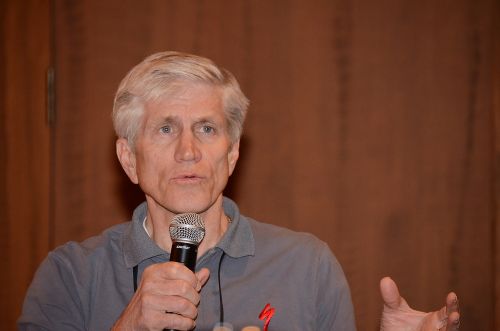MONTEREY, CA (BRAIN) — With five minutes to present an idea that could make a big impact on the industry, five industry leaders took to the stage Thursday morning during a session moderated by Jenn Dice, vice president of government relations for Bikes Belong, at the Bicycle Leadership Conference.
Here are some snippets from each presenter:
• Bobbie Parisi, Yakima’s global vice president of brand, emphasized that suppliers must create emotional connections and elicit emotional triggers with consumers. “Product is king,” she said. “But emotion is queen.” As an industry, many companies focus too much on the competitive spirit of the sport instead of some of the basic emotions most consumers associate with riding such as fear or joy. Parisi said Yakima recently went through a rebranding process. In the rack segment, two companies hold the majority of market share and both were caught talking about the features and benefits of product. Now, Yakima has changed its brand communication with consumers to focus on how they’re using the product and how racks let them bring friends along on a riding adventure.
• Trek president John Burke said the way for the industry to grow sales is to build more places to ride. He said the bike market grew from $3 billion in 1992 to $6 billion in 2012, and attributed the growth to the road bike boom and investment in infrastructure. The majority of Americans (60 percent) are interested in cycling but have concerns about safety, Burke argued. Most bike companies spend 97 percent of their resources on marketing and 3 percent on advocacy. “We need to shift our resources,” Burke said. He challenged the industry to triple the bike business in 13 years by investing in advocacy. “There are over 200 companies in this industry and only seven are participating in advocacy,” Burke said. “That’s why I’m optimistic that we can get to $18 billion by 2025. We have an opportunity to triple the business in 13 years, but don’t just think only the big companies make a difference.”
• Michael Morrow, CEO of Nutcase Helmets, said companies need to harness the power of creativity and its potential to bring new people into cycling. Morrow, a former Nike executive, stumbled upon the idea for a new helmet brand after fashioning a couple of football fan helmets for a rivalry game between University of Oregon and Oregon State. They got such interest that he thought he could apply that creativity and graphic freedom to bike helmets, that for the most part, all looked the same. One of his company’s top sellers is the watermelon helmet. It’s all about unique graphics and lots of customization, he said, and how cool-looking product can drive industry sales.
• Dave Edwards, president of Primal Wear, challenged the industry to think differently about how it spends its sponsorship dollars. Primal Wear, for example, sponsors major charity events including the Tour de Cure and Bike MS. The Tour de Cure reaches some 170,000 cyclists with 187 events. It draws participation of 13,590 teams, he said. Through its Primal Gives Back program, teams that buy apparel including jerseys or jackets from Primal get 15 percent back in support of their charity or cause. Edwards said through this program, Primal Wear donated $50,482 to the BP MS 150 in Houston, which draws participation of some 78 teams.
• Ellen Johnson, vice president of business development for Pacific Cycle, presented her “2=2” philosophy, or two miles equals two wheels. She shared how she’s personally made it a priority to bike to any place that’s within two miles of where she lives. And it’s something she always brings up with her circle of friends and family to spread the message at the local level. “This isn’t a new concept,” she admitted. But it’s something everyone could do to change America’s collective mindset about cycling.
• Bob Margevicius, executive vice president of Specialized, identified two ideas as “game changers.” First, he said, companies need to make gratitude part of their culture. “There are two things people value more than sex and money: praise and recognition,” he said. A simple gesture such as a personal handwritten note or taking the time to give someone a pat on the back can go a long way. The second game changer are new free trade agreements that are currently in the works. Of particular interest are the Transpacific Partnership (TPP) that includes Australia, Brunei, Chile, Canada, Malaysia, New Zealand, Peru, Singapore, Vietnam, and the U.S, and TAFTA (Transatlantic Free Trade Area), a proposed free trade agreement between the U.S. and the European Union. “Both are designed to shift manufacturing from current sources to others in the world,” Margevicius said. “Watch the developments on these. These bilateral trade agreements can really help us grow this business.”


